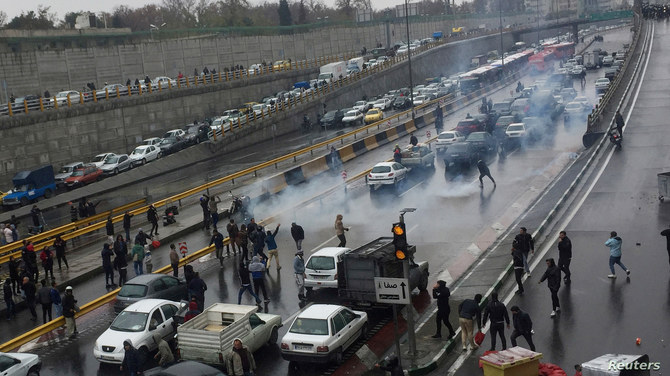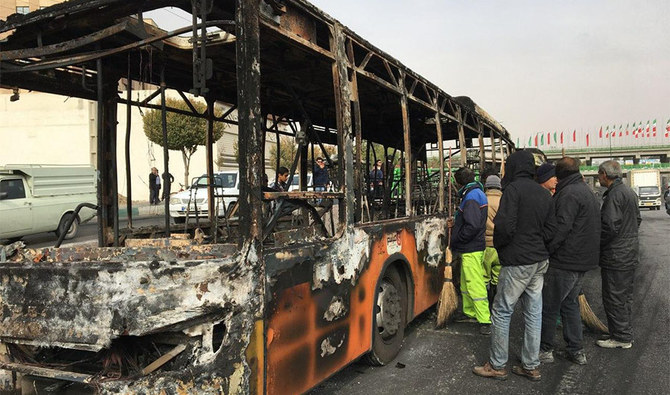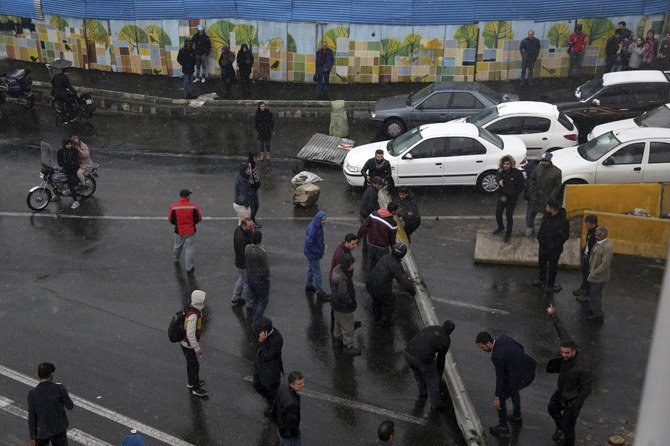TEHRAN: Iran’s supreme leader on Sunday threw his support behind a decision to hike petrol prices, a move that sparked nationwide unrest in which he said "some lost their lives.”
A policeman was killed in the western city of Kermanhshah in a clash with armed "rioters", the second confirmed death since protests erupted across Iran on Friday.
Ayatollah Ali Khamenei blamed "hooligans" for damaging property despite widespread anger at the increases and as Iranians suffer from the country’s economic woes.
Several people were also wounded and dozens arrested in two days of demonstrations that saw motorists block highways and others attack and set fire to public property.
In a speech aired on state television, Khamenei said "some lost their lives and some centres were damaged".
The White House on Sunday condemned Iran for using "lethal force" against the demonstrators.
"The United States supports the Iranian people in their peaceful protests against the regime that is supposed to lead them," White House press secretary Stephanie Grisham said.
State news agency IRNA said the protests struck more than 100 Iranian cities and towns. Iran's semi-official Fars news agency said 1,000 protesters had been arrested and 100 banks torched.
The protests flared hours after it was announced that the price of petrol would be raised by 50 percent for the first 60 litres (16 gallons) and by 300 percent for anything above that each month.
It is a rise many consumers can ill afford, given that Iran's economy has been battered since May last year when President Donald Trump unilaterally withdrew the US from a 2015 nuclear agreement and reimposed crippling sanctions.
The rial has plummeted, inflation is running at more than 40 percent and the International Monetary Fund expects Iran's economy to contract by 9.5 percent this year and stagnate in 2020.
The petrol pricing plan was agreed by the High Council of Economic Coordination made up of the president, parliament speaker and judiciary chief.
Khamenei said that "I am not an expert and there are different opinions but I had said that if the heads of the three branches make a decision I will support it.
"The heads of the branches made a decision with the backing of expert opinion and naturally it must be implemented," he said.
"Some people would definitely get upset over this decision... but damaging and setting fire (to property) is not something (normal) people would do. It is hooligans."
Opinion
This section contains relevant reference points, placed in (Opinion field)
Following his speech, parliament cancelled a motion to reverse the price hike, semi-official news agency ISNA reported.
President Hassan Rouhani defended the controversial hike in gasoline prices during Sunday’s Cabinet meeting, arguing the alternatives were less favorable.
But Dr. Mohammed Al-Sulami, an expert in Iranian affairs, said that Rouhani’s remarks “may be read by protesters as a sign of weakness from the government and thus lead to raising the ceiling of popular demands, especially as most of the slogans chanted by the demonstrators hit Khamenei personally and the regime of the Islamic Republic, burning images of Khamenei and attacking the headquarters of the Basij forces.
“The coming days remain important, especially if the protests continue until Friday,” he said. “The protests are expected to widen and increase in frequency.”
Some of the worst violence was in the central city of Sirjan, where acting governor Mohammad Mahmoudabadi said a civilian was killed and fuel stations were among the public property attacked and damaged.
In Kermanshah, a policeman died Sunday, a day after a "confrontation with a number of rioters and thugs," the provincial police chief told IRNA.
In Tehran on Saturday, protesters were seen shouting slogans and burning tyres on a street.
Similar scenes were witnessed in the cities of Shiraz, Isfahan and Bushehr, where security forces fired tear gas and water cannon at demonstrators.
Forty "disruptors" were arrested in the central city of Yazd after clashing with police, the province's public prosecutor told ISNA on Sunday. Most were not locals, he added.
Police said security forces would "not hesitate to confront those disrupting peace and security and will identify the ringleaders and field forces and confront them".
The intelligence ministry said those behind the unrest "have been identified" and that measures would be taken against them, according to ISNA.
Access to the internet has been restricted since the demonstrations broke out.
Netblocks, an internet monitoring website, said late Saturday the country was in the grip of a shutdown.
"Confirmed: Iran is now in the midst of a near-total national internet shutdown; realtime network data show connectivity at 7% of ordinary levels after twelve hours of progressive network disconnections," it said on Twitter.
It came after a decision by the Supreme National Security Council, according to a report by ISNA on Sunday.
"Upon the decision of the Security Council of Iran and communicated to internet operators, access to internet has been limited as of last night and for 24 hours," it said, quoting what it called an informed source at the information and communications technology ministry.






















